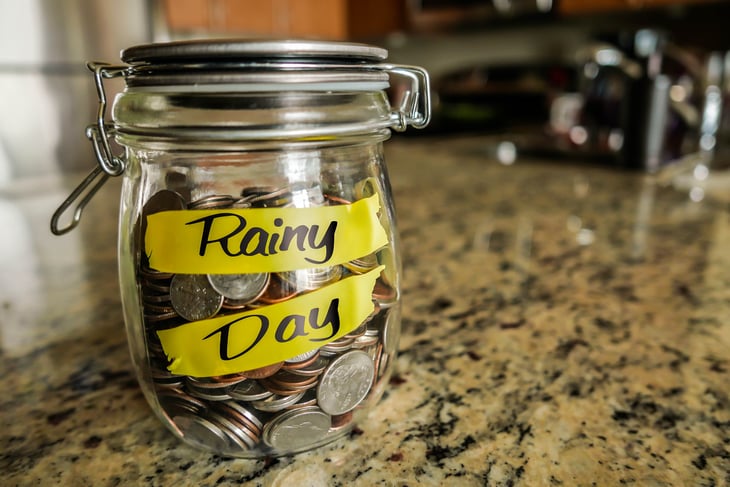
This story originally appeared on The Penny Hoarder.
If lately it feels like your financial strategy has to change depending on the day — and sometimes the hour — it’s not just you.
Unemployment rates hit a record high in April, and despite recovering somewhat since, there are still millions of people unemployed — and gains could be lost as states decide whether to close again. The stock market has been on its own roller coaster ride, and daily news reports can leave your head spinning.
With the world lurching from one crisis to the next, managing your money can feel impossible.
It can all be overwhelming, and crisis money management hardly seems like a long-term solution. But with no foreseeable relief from the turmoil, we’re here to offer a little stable ground to plant your financial future.
No one is in exactly the same situation financially, but you can customize each of these strategies based on your own situation.
1. Hold Onto Cash

Whether it’s the stimulus check or just the small savings from eating out less often, you may have some extra cash.
So, is now the time to put a dent in the credit card balance or tackle that student loan?
We asked the experts.
“I can understand wanting to get rid of an extra debt payment, but if there really is a concern about losing a job, I’m going to say have as much cash on hand as possible,” said Todd Christensen, an Accredited Financial Counselor with MoneyFit.org, a nonprofit debt relief program.
Are you sure?
“Right now I would not advocate for people to try to pay down credit card balances,” said Michael G. Thomas Jr., an Accredited Financial Counselor with a doctorate in financial planning from the University of Georgia. “If everything works out, you have this money you were setting aside.”
Really?
“You should probably hold onto cash,” said Ariel Ward, Certified Financial Planner at Abacus Wealth Partners.
OK, you get the idea.
The financial experts agree: In these uncertain times, cash is still king. Make your minimum payments, but if there’s any question about the stability of your income, hold onto the cash.
2. Make Your Emergency Fund a Priority

This one is a must: Build an emergency fund.
If you have cash to cover three to six months of expenses, you’ll be better able to weather whatever financial storm comes your way.
But don’t let expert recommendations overwhelm you — even having a few hundred dollars tucked away can help when you need to put food on your table this week.
By keeping the emergency fund out of sight, you’ll limit the temptation to tap it for non-urgent expenses. Whether it’s a separate bank account or just a mason jar hidden under your bed, create a barrier that will hinder — but not prevent — you from accessing the money when you really need it.
3. Seek Out Additional Cash Flows

If cash is essential, having more of it helps, right?
Finding an additional source of income — whether it’s a side gig, a bridge job or a work-from-home opportunity — offers a backup if your current employment is tenuous.
It never hurts to know what’s out there. Work-from-home job opportunities abound. Find yours in our portal, updated every weekday.
Even if you feel like your job is fairly stable, finding a second source of income — and keeping your resume and LinkedIn profile updated — will better prepare you in case of an unexpected job loss.
4. Only Use Reprieves When Necessary

You’ve undoubtedly seen the offers from lenders: “If you can’t pay your bill, we can work with you.”
And if you’ve lost your job and must choose between basic life necessities, you should absolutely call lenders to ask about hardship programs and other forms of forbearance.
However, “if you can afford to make the payments during this, absolutely do,” Christensen said. “Don’t stop making payments just because the offer is there.”
If you have federally held student loans, you automatically receive interest-free forbearance. Here’s how to decide whether — and how — to use the forbearance period.
Why shouldn’t you take advantage of every chance you have to hold onto that money?
Because eventually the bills will come due. And if it’s a bit of a stretch to cover your rent and your electric bill, putting off the payments to free up some spending money will only come back to haunt you.
Many of the offers to delay payments come with a price tag, like fees and additional interest. And when that even bigger bill hits your door, do you really think you’ll suddenly be flush with enough cash to cover last month’s and this month’s bills?
5. Stay Flexible

What was your cash flow like in March compared to January? If you’re like a lot of people, those numbers were significantly different, so your budget should adjust.
Whether you’re pulling back due to a loss of income, riding steady or feeling a bit flush with a new source of income, you can stay flexible by creating multiple budgets.
Yes, it’d be easier to set one budget and forget it. But deciding ahead of time what you can cut from and add to your spending plan allows your finances to quickly adapt to our ever-changing world.
In fact, use the budgeting exercise to help you decide what matters most to you. You’ve had a few months at home: What did you miss most? What did you realize you could do without?
Use that moment of self-reflection to create financial goals you can stick with through any crisis.





Add a Comment
Our Policy: We welcome relevant and respectful comments in order to foster healthy and informative discussions. All other comments may be removed. Comments with links are automatically held for moderation.